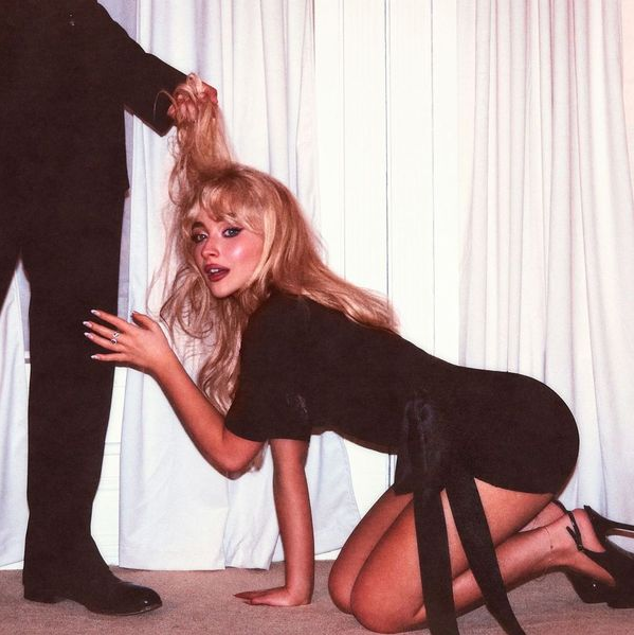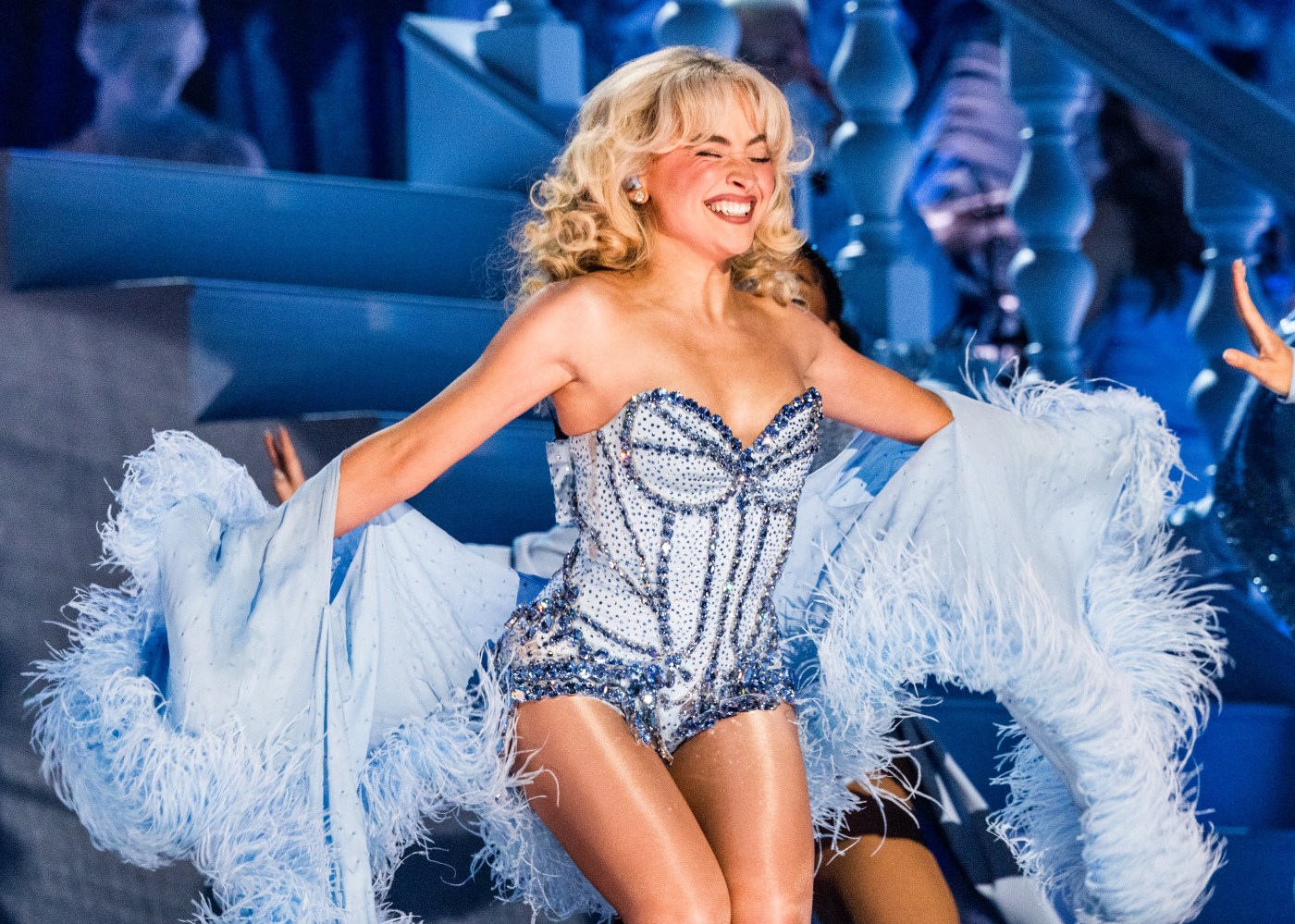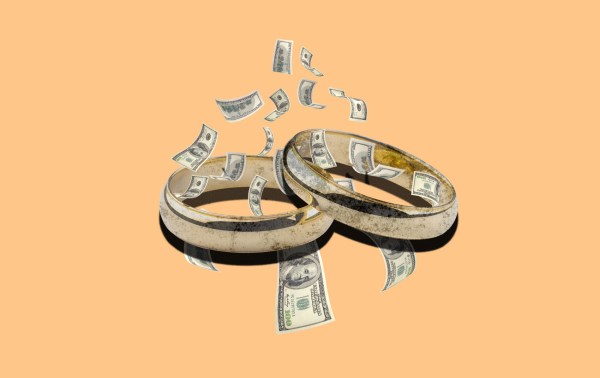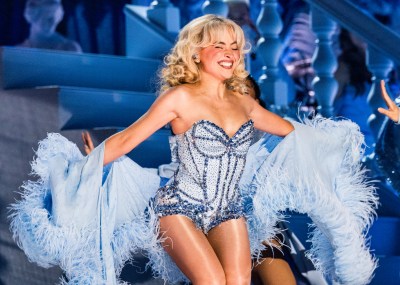If you tuned into pop radio stations last summer, you probably heard plenty of Sabrina Carpenter, the 26-year-old glam, blonde pop star who at the time was dominating playlists. Indeed, Taylor Swift herself dubbed summer 2024 the “Summer of Sabrina,” after Carpenter joined Swift as an opening act on the groundbreaking Eras tour. And even if you don’t know Carpenter by name, chances are you’ve heard her biggest solo hit from last year, the one Billboard crowned its Global Song of the Summer and that earned her a Grammy for best pop solo performance: “Espresso.”
Last week, however, many feminists online—including some within Carpenter’s own fanbase—soured on her because the album cover for her upcoming Man’s Best Friend had seemingly crossed a respectability line. A photograph by Bryce Anderson shows Carpenter kneeling in a black minidress, her blonde hair held up like a leash by a faceless man in a suit standing beside her. She wears a collar that reads: “Man’s Best Friend.” The pose is deliberately provocative and patently retro, right on brand for Carpenter and unmistakably designed to stir controversy. Marie Solis of The New York Times pointed out that the album cover “seems caught in a dichotomy of—is it oppressive or empowering?” One feminist group called it “regressive,” while others accused Carpenter of feeding “the male gaze” and embracing imagery that reinforces harmful power dynamics. “Sabrina putting us back 50 years,” wrote one fan on Carpenter’s Instagram post sharing the new cover.

Many of Carpenter’s fans quickly sprang to her defense, arguing that those accusing her of lacking social awareness might need to take a lesson in satire. As one fan wrote: “I interpret the image as deliberate satire on gender roles—a critique of the idea that women should be loyal and submissive, like ‘a man's best friend,’ i.e., a dog. The provocative nature of the image seems to be the point: to highlight how absurd that expectation is.” The most ardent fans, then, believe that Sabrina is trolling everyone: She’s showing how galling the patriarchy is by putting it on direct display.
One could even say she’s pulling a move not unlike Taylor Swift’s “Shake It Off” era, leaning into the public’s caricatures of her as a serial dater or a hopeless romantic. “I go on too many dates/ But I can't make 'em stay/ At least that’s what people say,” Swift sang in one of her most iconic songs. Carpenter, like Swift before her, seems to be playing with and subverting the criticism of her as a ditzy, buxom beauty rather than cowering before it. She’s the artist; say what you want, she is who she is. Carpenter’s 2022 song “because i liked a boy,” draws on this public scrutiny: “I'm a homewrecker, I'm a slut/ I got death threats fillin' up semi-trucks/ Tell me who I am, guess I don’t have a choice.” And it does seem telling that, like Swift before her, she’s making a deliberate choice in the face of all this scrutiny: to stay funny (a trademark of who she is), relentlessly cheerful, sexy, and a star entirely of her own making—regardless of public opinion.
As such, the feminist penning this article is going to make a slightly different argument, one that isn’t about whether Carpenter is “oppressive” or “empowering,” either personally or in the styling of her album cover. Neither am I going to malign Carpenter, as many articles and podcasts have, by insisting she isn’t as smart or introspective as Lana Del Rey or Taylor Swift in how they couch their lyricism and feminist imagery. Nor do I argue, as some fangirls have (even if I sympathize with them), that Carpenter is a media-literacy genius playing 4D chess.
No. What’s great about Sabrina Carpenter is that she gets a simple truth: Both feminists and women writ large are imperfect—and she sings about that. The relationships women have in their 20s often don’t reflect some enlightened feminist ideal of what relationships should be, because they involve two still-very-much-forming people, learning what they need from themselves, from each other, and from a future not yet fully fleshed out in the imagination. A future that largely depends on what that formation of self—and self with someone else—might look like in the long term (and what it actually feels like in the short term, too). On average, relationships in this stage of life last about two to four years. Most of Carpenter’s listeners are women (approximately 75 percent), and most are between 18–34 (about 70 percent), with another 20 percent skewing even younger, between 13 and 17. And what does Sabrina Carpenter do best? She has fun musing about these relationships and all their dynamics. She’s a pop star who offers women a few minutes of pure, unadulterated enjoyment—free from anyone’s criticism of their relationship choices, good or bad. They’re invited to sing along and have fun, to laugh, to play, to forget the drama (and the judgment!) that complicate their everyday romantic and friendship lives—and to commiserate with each other.
If you only know Sabrina Carpenter from the viral debates playing out online—the album cover, the Billboard charts, the endless think pieces—what you may be missing is that, while she may not be a great satirist (at least in this one feminist’s opinion), she is a comic and relational genius. In her lighthearted shows and sparkling lyrics—which she proudly writes alone or alongside a co-writer—she makes people laugh and, quite frankly, feel happy. Her music videos recall the vibrant, playful aesthetics of the ’80s and ’90s. She’s akin to a modern Cyndi Lauper, radiating the same carefree spirit as “Girls Just Wanna Have Fun,” complete with bright hair energy to match. (Lauper’s famous bubblegum pinks and oranges, both in her life and her videos, feel very Carpenter-coded). Like Katy Perry’s Teenage Dream era, Carpenter leans into campy, candy-colored fantasy. Songs like Perry’s “Last Friday Night (T.G.I.F.),” with its over-the-top party narrative and self-mocking humor, offered millennial, Glee-inspired women the same thing Carpenter offers now: playful, tongue-in-cheek songs about love, somewhat questionable decisions, and messy relationships that still leave room for laughter, bonding, and fun.
Yet all this fun isn’t always easy, believe it or not, as the criticisms above elucidate. In a revealing interview with Rolling Stone that appeared only one day after the Man’s Best Friend album cover dropped, Carpenter reflected on the cultural moment: “I don’t want to be pessimistic, but I truly feel like I’ve never lived in a time where women have been picked apart more, and scrutinized in every capacity. I’m not just talking about me.” And I think she’s right. With the rise of the internet, Carpenter might be echoing Cyndi Lauper and Katy Perry, but they had dial-up modems to contend with, not 24/7 media buzz. Lauper and Perry might’ve been asked about the messages in their songs, but no one expected them to layer every glittery track with a feminist ethic, or to smooth out every contradiction between how they felt, what they sang, and how strangers on the internet might take it. Today, women like Carpenter are expected to account for every emotion, every image, every lyric, as if they must always be testifying to some larger social or ideological project, rather than simply expressing (and enjoying) what it feels like to be in the middle of becoming. Back then, it was enough for Lauper and Perry to help the feminist movement by letting women have some fun at their shows and express their emotions, which is exactly what my undergraduate students mention when they talk about attending and loving Sabrina Carpenter concerts.
One of the strongest examples of Carpenter’s lively humor is the video for “Taste.” At first listen, the lyrics seem to revel in a kind of “mean girl” bravado, part rivalry, part revenge fantasy: “Well, I heard you're back together and if that's true/ You'll just have to taste me when he's kissin' you.” But the video is as subversively female-powered as it is camp. In it, Carpenter and another woman start out fighting over a man but eventually join forces (in an explicit tour de force not to be watched with children). The whole thing is absurd, over-the-top, and darkly funny, poking fun at the way women are so often pitted against each other, while flipping the script into female solidarity. It’s a kind of fun that will resonate with anyone who’s ever been through a situation like that—and I suspect quite a few 20-something-year-old women have, even if it wasn’t their proudest experience.
Ultimately, Carpenter offers audiences a levity that defies the kind of cultural purity so often expected of young women today—a rarity for female artists in a moment that prizes sharp takes and serious messaging. Her album cover opens up a conversation about how women often feel: both degraded and desired. Like it or not, young women still feel trampled on by the patriarchy—but many also love men. This doesn’t mean that all young women share Carpenter’s vision; plenty of other pop stars right now offer alternatives to her vamp-camp-playful aesthetic. Yet I appreciate the lightness and messiness that Carpenter brings to the pop culture table.
Film scholar Nancy Reincke once stated that “Women’s laughter counteracts dominance when it constructs a counterknowledge ... produced through female bonding. ... The threat to male dominance isn’t women laughing at men; the threat is women laughing with women.” To be honest, if Sabrina Carpenter is playing 4D chess (and again, I don’t think she is), this is how she’s doing it: by bringing women together to laugh at their relationships—and at themselves—because young women know they’re not perfect. And maybe it’s time we stop putting the pressure on them to be so, even in the music they listen to. Let them have some fun, hang out by the pool, and complain about why they’re in yet another relationship with a “Manchild,” where “If I’m not there/ it won’t get done.”
That’s why the outrage over Carpenter’s album cover ultimately misses the point. She isn’t offering a manifesto; she’s offering a moment, or really, a series of moments. We see this in the self-aware camp of her masterfully shot music videos: She’s not trapped by the imagery of this or any other album—rather, she’s playing with it, and she’s having fun. That laughter, imperfect, playful, and free, may not offer the kind of empowerment some online critics are searching for. But love, like pop music, will always include at least a little bit of “Nonsense.”







Please note that we at The Dispatch hold ourselves, our work, and our commenters to a higher standard than other places on the internet. We welcome comments that foster genuine debate or discussion—including comments critical of us or our work—but responses that include ad hominem attacks on fellow Dispatch members or are intended to stoke fear and anger may be moderated.
With your membership, you only have the ability to comment on The Morning Dispatch articles. Consider upgrading to join the conversation everywhere.